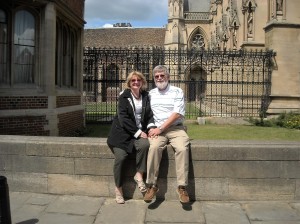In the Four Gospels we read selected accounts of the earthly mission of our Lord Jesus Christ. He came to set us free from an empty way of life (1 Peter 1:18). Often we fail to realize the depths of that emptiness. Let’s listen to how our Redeemer revealed that emptiness in his teaching and pointed us to a better alternative.
Luke has already set the scene for this teaching session. A crowd of many thousands gathered (12:1), and it was not a calm crowd. Please do not think of a typical church service in our day where people are bored with the building, the pastor, the music, the ritual prayers, the message, and each other. No, this crowd was trampling on each other in their shared eagerness to listen to Jesus. (The time when modern churchgoers trample upon each other is to get out of the building and the parking lot.) This, however, did not mean that this crowd was filled with spiritual, godly, heavenly-minded people.
After the Lord spoke directly to his disciples (12:1-12) about the important topic of fear and worry, a question comes from the crowd. Someone in the crowd said to him, “Teacher, tell my brother to divide the inheritance with me.” [All italicized quotes are from the NIV.] Ah, there can be many people in “church”, and many of their hearts are not thinking about meeting with the living God and his dearly loved Son, but their minds are on other personal and “important” matters. People are very easily distracted from God.
The Lord Jesus, instead of brushing aside the man’s impertinent request, used it as a teaching opportunity, because he had come to make God known and to reveal what we are to us. Jesus replied, “Man, who appointed me a judge or an arbiter between you?” Then he said to them, “Watch out! Be on your guard against all kinds of greed; life does not consist in an abundance of possessions.” It was a dangerous course to ask Jesus questions. The man perhaps thought that Jesus would take his side out of a concern to see justice done. But Jesus unmasked the greed in the man’s heart. Though he had gathered with the crowd to hear Jesus, he was a functional idolater (Colossians 3:5). Jesus warned his hearers of getting their identity from their possessions. This is a problem in our affluent culture. It is too easy to confuse what we have with who we are. We can learn this about ourselves from how we evaluate others by where they live, what they drive, the clothes they wear, or the places they go. People might say they admire those who devote their lives to helping others, but are they willing to divest themselves of their possessions to do it? We can drift into this kind of transfer of identity, which is why Jesus calls us to be on our guard against all kinds of greed. Where should our identity come from?
Next, Jesus told a story to warn everyone about greediness. And he told them this parable: “The ground of a certain rich man yielded an abundant harvest. He thought to himself, ‘What shall I do? I have no place to store my crops.’ “Then he said, ‘This is what I’ll do. I will tear down my barns and build bigger ones, and there I will store my surplus grain. And I’ll say to myself, “You have plenty of grain laid up for many years. Take life easy; eat, drink and be merry.”’ “But God said to him, ‘You fool! This very night your life will be demanded from you. Then who will get what you have prepared for yourself?’” This parable is very well-known, and I will make only a few observations. First, the providence of God was working for the prosperity of this rich man. While there is skill in being a successful farmer as well as other occupations, God’s rule of the world overrides the skill of people. If there had been a couple years of drought, the rich farmer would not have had a large crop. Second, God’s blessing on his crop had brought the rich man to the need to make new choices. Prosperity and poverty require us to make decisions. What should a person do when he or she prospers? Consider Romans 2:4. Third, the rich man’s heart was filled with himself. He was proficient at using the first person pronouns. Greed is idolatry, and so is a consuming interest in oneself. Fourth, he thought he knew the future. People proudly assume that they are in charge, that they can map out their lives. The rich man’s attitude can be shared by anyone. Fifth, he lived for pleasure. Hmm, it sounds like he was a “last day’s sort of person” (cf. 2 Timothy 3:1-4). Sixth, God interrupted his plans. This is what people forget. The living God can expose our true emptiness in a moment.
Jesus made his point. “This is how it will be with whoever stores up things for themselves but is not rich toward God.” The Lord Christ is teaching us the nature of true repentance. We must turn from a self-focused view of life to building our life and identity in relationship to God. Being rich toward God is true wealth. We must prefer the true God over all things.
What is the question you would like to ask Jesus? Since he knows your heart, how would he answer you?
Grace and peace, David










